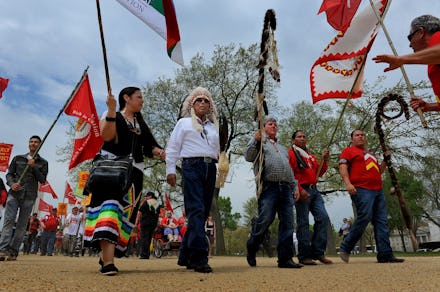Minneapolis Just Made a Revolutionary Move the Rest of America Wouldn't Dare

The news: It's taken almost 40 years, but Minneapolis has accomplished a feat certain to piss off thousands of red-blooded #Amuricans: establish a holiday directly opposed to Columbus Day.
Starting this fall, Indigenous People's Day will be held the second Monday of October, the date federally reserved to commemorate Italian explorer and known mass murder Christopher Columbus. It's an accomplishment 37 years in the making: A "Native Nations delegation" proposed the holiday to the UN in 1977, followed by representatives from "120 indigenous nations" 13 years later.
On Friday, the Minneapolis City Council voted unanimously to make it a civic holiday.
"We are sending a signal across the nation and to the global community that we make these changes in the spirit of truth-telling," said City Council member Alondra Cano. "This is not about Columbus; he is not the center of our existence. This is about the power of the American Indian and people in indigenous communities all over the world."
How will Indigenous People's Day be celebrated? The resolution explains:
"Indigenous People's Day shall be used to reflect upon the ongoing struggles of Indigenous people on this land, and to celebrate the thriving culture and value that Dakota, Ojibwa and other indigenous nations add to our city."
Although Columbus Day remains a holiday in the city, many view this as a victory of history over mythology: "Now that we have established Indigenous People's Day, every child — whether that child is native or whether that child is not — will learn the truth about where America really comes from," said Rep. Keith Ellison (D-Minn.). "This is so important because it's difficult to imagine, if you are from the mainstream experience, how it feels to sit in a classroom and be told there was darkness and then Columbus came and then there was light."
Image Credit: PolicyMic
Background: Since 1937, the federal government has celebrated the day Christopher Columbus allegedly "discovered" what's now known as the Americas. This is a problem not only in that it ignores the millions of indigenous people who'd already lived here for centuries, but also the legacy of disease, theft and murder Europeans subsequently left in the so-called "New World."
Many have criticized the holiday as a celebration of this violence. The introduction of Indigenous People's Day represents a step toward rectification:
"I have a heavy heart knowing that so many did not live to see this day," said indigenous Minnesotan Dianne Standing Cloud. "But my heart is also happy knowing my children and my grandchildren will grow up in a city that celebrates their indigenous heritage and culture."
It's an important step that will hopefully be echoed by an increasing number of cities and states moving forward. Meanwhile, Minneapolis can be viewed as a national pioneer: A metro that's taken major steps toward recognizing the complex and problematic history that's enabled our country's existence.